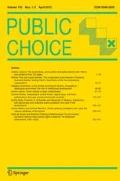Abstract
How does economic freedom, mainly how property rights are designed and protected, relate to income equality? Whilst this is argued to be theoretically ambiguous, the empirical results reveal that there is a positive relationship between changes in economic freedom and equality: the more a country increased its economic freedom between 1975 and 1985, the higher the level of equality around 1985. Most important in this regard is trade liberalization and financial deregulation. Also, there are signs that the level of economic freedom in 1985 is negatively related to the level of equality around that year, plausibly because of less redistribution.
Similar content being viewed by others
References
Atkinson, A.B. (1983). The economics of inequality. Oxford: Clarendon Press.
Barro, R.J. and SalaiMartin, X. (1992). Public finance in models of economic growth. Review of Economic Studies 59(4): 645–661.
Barro, R.J. and Lee, J.W. (1993). International comparisons of educational attainment. Journal of Monetary Economics 32(3): 363–394.
Davis, O.A. and Wu, W. (1996). Measuring economic freedom. Unpublished manuscript.
De Vannsay, X. and Spindler, Z.A. (1994). Freedom and growth: Do constitutions matter? Public Choice 78(3–4): 359–372.
Deininger, K. and Squire, L. (1996). Measuring income inequality: A new database. World Bank Economic Review 10(3): 565–591.
Fölster, S. and Trofimov, G. (1996). Does equality promote growth? Working Paper No. 461, The Industrial Institute for Economic and Social Research, Stockholm.
Gwartney, J.D., Lawson, R. and Block, W. (1996). Economic freedom of the world: 1975–1995. Vancouver, BC: The Fraser Institute.
Heston, A. and Summers, R. (1991). The Penn world table (Mark 5): An expanded set of international comparisons, 1950–1988. Quarterly Journal of Economics 106(2): 327–368.
Lindert, P.H. and Williamson, J.G. (1983). English workers' living standards during the industrial revolution: A new look. The Economic History Review 36(1): 1–25.
Myhrman, J. (1994). Hur Sverige blev rikt. Stockholm: SNS Förlag.
North, D.C. and Weingast, B.R. (1989). Constitutions and commitment: The evolution of institutions governing public choice in seventeenthcentury England. Journal of Economic History, 49(4): 803–832.
Nozick, R. (1974). Anarchy, state, and utopia. New York: Basic Books.
Perotti, R. (1996). Growth, income distribution, and democracy: What the data say. Journal of Economic Growth 1(2): 149–187.
Persson, T. and Tabellini, G. (1994). Is inequality harmful for growth? American Economic Review 84(3): 600–621.
Rawls, J. (1971). A theory of justice. Cambridge: The Belknap Press of Harvard University Press.
Rosenberg, N. and Birdzell, L.E., Jr. (1986). How the west grew rich: The economic transformation of the industrial world. New York: Basic Books.
World Bank (various years). World development report. Oxford: Oxford University Press.
Author information
Authors and Affiliations
Rights and permissions
About this article
Cite this article
Berggren, N. Economic freedom and equality: Friends or foes?. Public Choice 100, 203–223 (1999). https://doi.org/10.1023/A:1018343912743
Issue Date:
DOI: https://doi.org/10.1023/A:1018343912743




